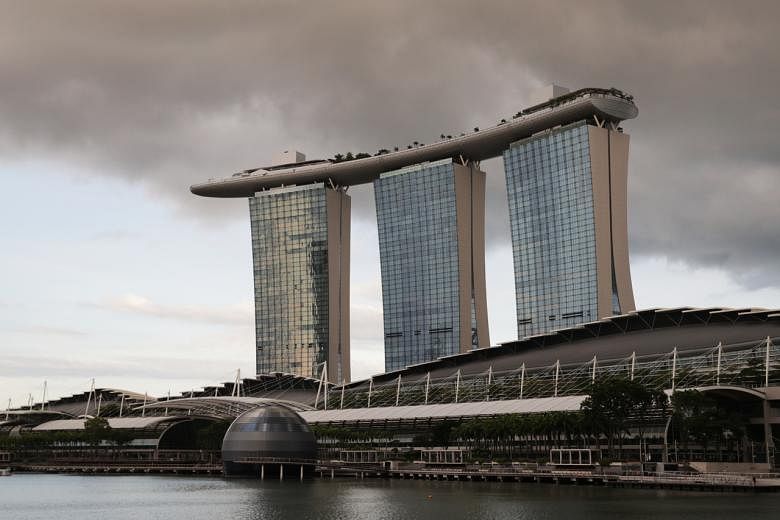We are just at the end of the beginning of the Covid-19 pandemic, said Prime Minister Lee Hsien Loong in his address to the nation on Tuesday, in which he explained why he was calling a general election.
"A long struggle lies ahead."
That struggle will entail pain and suffering on multiple dimensions, and on a scale that most of us have not witnessed in our lifetimes. It will also involve changes in the way we live, work, play and transact. It is a crisis like no other.
At its fount is a health crisis. In barely six months since Covid-19 broke out, there are already more than nine million confirmed infections around the world - with cases still rising in many countries - and close to half a million deaths, and counting. No continent, and hardly any country, has been spared.
The economic carnage is likely to be colossal.
In its latest forecasts released on Wednesday, the International Monetary Fund (IMF) projects that in what is likely to be the worst recession since the Great Depression of the 1930s, the global economy will shrink by 4.9 per cent this year - 1.9 percentage points below what it forecast as recently as April, and a 7.8 percentage point swing from last year - and that is not even its worst-case scenario.
Advanced economies will contract by 8 per cent, while Asia's economic growth will turn negative, with all of the region's economies contracting except China, which will eke out 1 per cent growth. World merchandise trade will collapse by up to one-third, according to the World Trade Organisation.
ECONOMIC DISTRESS
These aggregate numbers will translate into widespread economic distress: double-digit unemployment rates in many countries; soaring inequalities, as lower-paid workers, mainly in service industries, bear the brunt of layoffs; millions of bankruptcies; rising levels of debt as companies and households borrow to stay afloat; and the devastation of several industries such as airlines, bricks-and-mortar retail, hospitality and parts of entertainment - all of which will create negative feedback loops that could deepen the recession.
The crisis has also caused a rupturing of supply chains as factories in multiple countries were brought to a standstill, creating supply shocks. Supply chains are also shifting as countries move to reshore production, especially of essential goods like medical equipment, and diversify their sources of supply.
Simmering geopolitical tensions, particularly between the United States and China, are accelerating this process and, together with the mounting job losses, aggravating protectionist sentiments, which were already on the rise even before Covid-19.
The coming US presidential election will further inflame these sentiments as the two rival parties vie to be tougher on China.
Responding to the spiralling economic damage, governments around the world have launched war-footing counter-measures in the form of extraordinary monetary and fiscal expansion.
In Singapore, the Government has injected close to $93 billion in fiscal support over four Budgets in less than four months, running up a fiscal deficit equivalent to a record 15.4 per cent of gross domestic product, financed by a drawdown of reserves on a scale more than 10 times larger than during the global financial crisis of 2008.
But these counter-measures, as aggressive and unprecedented as they are, can at best cushion some of the pain. They cannot prevent growth from collapsing, or save every company or every job. As a small, export-dependent economy, Singapore will be especially vulnerable to crashing global trade and fracturing supply chains. Nor does it have much leeway to rely on its domestic market for growth, as some large countries will, to some extent, be able to do.
The closest thing Singapore has to a hinterland - South-east Asia - is similarly affected. Singapore's neighbours are also export-dependent and vulnerable to the disruptions in trade and tourism under way.
The IMF forecasts that the economies of Asean's five largest countries - Indonesia, Malaysia, the Philippines, Thailand and Vietnam - will contract by 2 per cent this year, after growing 4.8 per cent last year.
The saving grace, however, is that although they will take a hit, Asian economies, both in Asean as well as those of China, Taiwan, South Korea, Japan and Hong Kong, have weathered the Covid-19 crisis relatively well so far. They have also not succumbed to protectionism.
NO RETURN TO STATUS QUO
But what makes this crisis so unlike any other is that in its aftermath, the world will not return to the way it was pre-crisis - that is, pre-Covid-19. For example, as new consumer and working habits take shape, many industries will be profoundly changed.
As factories adapt to social distancing and the "reshoring" of production accelerates, more manufacturing will be automated and "robotised". In the service sector, industries such as retail, education, business and financial services, and even entertainment, will be more digitised.
Work-from-home arrangements - some of which will become permanent - will impact the way companies operate internally, recruit and serve their customers. It will also impact sectors such as commercial real estate and point-to-point transport. As companies cut their headcount to cope with the economic slowdown, more workers will be forced into self-employment or the gig economy.
In some industries such as tourism, aviation and bricks-and-mortar retail, job losses will be so widespread, severe, prolonged and, in some cases, permanent that many workers will need to make life-changing career decisions.
This will pose challenges to policymakers as well. As the IMF's chief economist Gita Gopinath pointed out in her address to the Asian Monetary Policy Forum in Singapore earlier this month, the focus of policy "has to shift from trying to keep workers matched to their sectors, to reallocating them to businesses that are actually growing and have the potential to absorb them".
Fortunately, Singapore has sectors and businesses that are growing or have the potential to grow, such as healthcare and other social services, pharmaceuticals, finance and a range of IT-related services.
However, creating 100,000 new jobs - as the Government intends to do - that can be filled by displaced workers from a variety of different industries will be a huge challenge, as will navigating the other economic disruptions and uncertainties the Covid-19 crisis will bring, including its side-effects and aftershocks in a less globalised world - some of which will come into view only months or years later.
If we are only at the end of the beginning, there is still a long way to go. It is not just the Covid-19 crisis that must be managed, but also what comes after, which could be a different type of crisis.
PM Lee put it aptly in his address on Tuesday: "The government that you elect will have critical decisions to make, which will impact your lives and livelihoods, and shape Singapore for many years to come, far beyond the five-year term of the next government."


